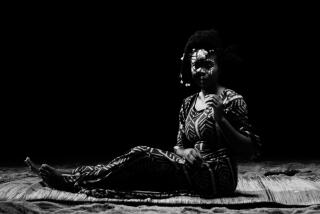Chief Stephen Osita Osadebe, 71; a giant of African highlife music
- Share via
Chief Stephen Osita Osadebe, a titan of the African popular music known as highlife whose 1984 “Osondi Owendi” was the biggest-selling record in the history of his native Nigeria, has died. He was 71.
Osadebe died May 11 of lung failure at St. Mary’s Hospital in Waterbury, Conn.
“In Nigeria he’s loved not only by one ethnic group but by all the ethnic groups,” said Nnamdi Moweta, Osadebe’s manager and the host of Radio Afrodicia on KPFK-FM (90.7) in L.A. “When you live in a country like Nigeria ... people go through a lot to survive, and we look for avenues to soothe this daily pain that we go through. His music played a very important role.”
In the United States, the names of Nigerian performers King Sunny Ade and Fela Anikulapo Kuti are better known. But in Nigeria, Osadebe had a long history of hit records. Fans there referred to him as the “Doctor of Hypertension,” a reference to the healing power of his music.
That joyous, celebratory music is highlife, the juncture where high-society bands and traditional African rhythms and idioms meet. Though Osadebe did not create highlife -- it was born in Ghana -- he did reinvent it by adding the sounds of merengue and rumba, said Moweta, who co-produced four of Osadebe’s albums.
In 2001, Village Voice writer Milo Miles compared Nigerian highlife music to the “fire-in-restraint” sound of the acclaimed Cuban group Buena Vista Social Club, and Osadebe to its late vocalist, Ibrahim Ferrer.
“Particularly on ‘Kedu America,’ Osadebe’s voice rustles with the parchment charm beloved in Ibrahim Ferrer,” Miles wrote.
Osadebe wrote more than 500 songs and prided himself on being a composer of music and lyrics. “My own belief is that if you cannot compose your song, you are not worth being a musician,” he said in a 2004 interview with the Daily Sun, a Nigerian tabloid.
Born in 1936, Osadebe was a chorister in his church as a boy, played in the school band and was interested in classical music.
“The man who mainly inspired me into singing was the late [Nat King] Cole, an American,” Osadebe said in the Daily Sun article. “He sang in English, Spanish and other languages. I loved his music.”
Throughout his decades-long career, Osadebe recorded in English, pidgin English and Ibo, the language of his ethnic group. He found national success in 1958 with his recording “Adamma,” a tribute to a beautiful woman.
After the Biafra war of the late 1960s, which left tensions along ethnic lines, the careers of many artists suffered.
“He managed to come back after the civil war when there was a rift in the country ... when really no one else did,” said Andrew Frankel, who produced three of Osadebe’s albums. “The poetry of his music and the philosophic way he speaks about life ... really set him apart.”
Osadebe and his band twice toured the United States, hoping to expose more of the world to his music. “Kedu America,” a 1996 hit, in English means “How are you, America?” Osadebe is survived by five wives and several children, many of whom live in the U.S.
His goal was to see not only his own music reach a wider audience, but that of his compatriots as well.
“A country without music is a dead nation,” Osadebe said in the Sun article. “Nigerian musicians are great people, and musically Nigeria is great. The unfortunate thing is that we are not accorded the recognition due to us.”
*
More to Read
The biggest entertainment stories
Get our big stories about Hollywood, film, television, music, arts, culture and more right in your inbox as soon as they publish.
You may occasionally receive promotional content from the Los Angeles Times.








